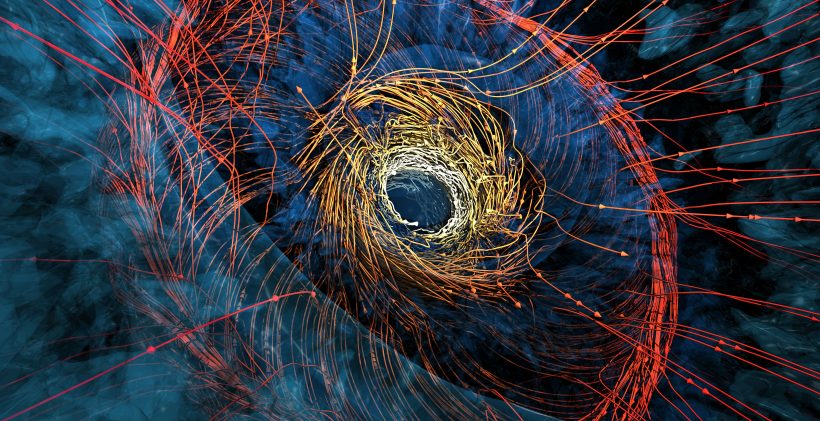Argonne researchers to share computing innovations at SC21 conference
Scientists from the U.S. Department of Energy’s Argonne National Laboratory will share the laboratory’s research and expertise in high performance computing (HPC) at the 33rd International Conference for High Performance Computing, Networking, Storage, and Analysis. Known widely as SC21, the annual conference will be held November 14-19, 2021, in St. Louis as a hybrid event with both in-person and virtual attendees.
Continuing Argonne’s long history of participation in the SC conference series, more than 90 staff researchers will attend virtually and contribute to conference activities on topics ranging from artificial intelligence (AI) and exascale technologies to HPC software and quantum computing.
“With exascale on the horizon and the continued emergence of AI for science, it’s an exciting time for the research community to convene at SC21 and shine a light on the latest innovations in scientific computing,” said Michael Papka, director of the Argonne Leadership Computing Facility (ALCF). “We’re looking forward to sharing Argonne’s pioneering work to accelerate scientific discoveries in this ever-changing HPC landscape.”
The laboratory’s conference activities will include technical paper presentations, invited talks, workshops, “birds of a feather” sessions, panel discussions and tutorials. In addition, Argonne will be partnering with the other DOE national laboratories to provide virtual talks and demos at the DOE’s conference booth (Booth #2227).
Some notable Argonne activities are highlighted below (Argonne staff member names are in bold). For the full schedule of the laboratory’s participation in the conference, visit Argonne’s SC21 webpage.
Performance Tuning with the Roofline Model on GPUs and CPUs
Presenters: Samuel Williams, Aleksandar Ilic, JaeHyuk Kwack, Neil Mehta, Zakhar Matveev, Max Katz
Date/Time: Sunday, November 14, 8:00 a.m. – 5:00 p.m. CST
Argonne’s JaeHyuk Kwack will be part of a multi-institutional team leading a day-long tutorial on using the Roofline model to improve the performance of scientific applications running on supercomputers powered by central processing units (CPUs) and/or graphics processing units (GPUs). The tutorial will include hands-on instruction, as well as discussions of real-world use cases at ALCF and other supercomputing facilities.
ExaWorks: Developing Robust and Scalable Next-Generation Workflows, Applications, and Systems
Presenters: Dan Laney, Shantenu Jha, Kyle Chard, Justin Wozniak, Dong Ahn, Stephen Herbein, Aymen Al Saadi
Date/Time: Monday, November 15, 8:00 a.m. – 12:00 p.m. CST
Argonne’s Justin Wozniak and Kyle Chard will contribute to a tutorial on the ExaWorks software development kit. Developed with support from DOE’s Exascale Computing Project, ExaWorks enables researchers to produce scalable and portable workflows for a wide range of exascale applications. The tutorial is designed to equip attendees with practical knowledge to develop best workflow practices for managing large-scale research campaigns on the world’s largest supercomputers.
Performance Evaluation and Acceleration of the QTensor Quantum Circuit Simulator on GPUs
Authors: Danylo Lykov, Angela Chen, Huaxuan Chen, Kristopher Kiepert, Zheng Zhang, Tom Gibbs, Yuri Alexeev
Date/Time: Monday, November 15, 10:30 – 11:00 a.m. CST
Argonne researchers will contribute to three paper presentations at the Second International Workshop on Quantum Computing Software. For one of the studies, Argonne’s Danylo Lykov and Yuri Alexeev will share their team’s work to port and optimize the QTensor quantum simulator to run on GPU-accelerated supercomputers. The development of fast and efficient simulators, such as QTensor, is key to advancing the field of quantum information science.
KAISA: An Adaptive Second-Order Optimizer Framework for Deep Neural Networks
Authors: J. Gregory Pauloski, Qi Huang, Lei Huang, Shivaram Venkataraman, Kyle Chard, Ian Foster, Zhao Zhang
Date/Time: Tuesday, November 16, 10:30 – 11:00 a.m. CST
Argonne’s Ian Foster and Kyle Chard are part of a multi-institutional team that will present a paper on KAISA, a framework for improving the performance and scalability of deep neural networks. The team demonstrated KAISA can balance memory and communication to achieve scaling efficiency equal to or better than various baseline optimizers.
Powering HPC Discoveries through Scientific Software Ecosystems and Communities
Presenter: Lois Curfman McInnes
Date/Time: Wednesday, November 17, 1:30 – 2:15 p.m. CST
Argonne’s Lois Curfman McInnes will deliver an invited talk on the Extreme-scale Scientific Software Stack (E4S) being developed through DOE’s Exascale Computing Project (ECP). The talk will cover how E4S—a portfolio-driven effort to collect, test and deliver the latest advances in open-source HPC software technologies—is helping to overcome challenges in collaboration across multi-institutional teams. McInnes, who serves as ECP’s deputy director of software technology, will also discuss strategies that can help increase developer productivity and software sustainability.
Resilient Error-Bounded Lossy Compressor for Data Transfer
Authors: Sihuan Li, Sheng Di, Kai Zhao, Xin Liang, Zizhong Chen, Franck Cappello
Date/Time: Thursday, November 18, 4:00 – 4:30 p.m. CST
Lossy compression is an important strategy for addressing big data challenges in scientific research, but researchers need such tools to protect against the silent errors that can occur during compression and data transfers. In a paper presentation on Thursday, November 18, Argonne’s Sheng Di and Franck Cappello and colleagues will detail their development of a lossy compression tool that is resilient against silent data corruption.
Great Edge-pectations: How Edge and Exascale Found Love
Moderator: Pete Beckman
Panelists: Lavanya Ramakrishnan, Rick Stevens, Satoshi Matsuoka, Eric Van Hensbergen
Time: Friday, November 19, 10:30 a.m. – 12:00 p.m. CST
Argonne’s Pete Beckman (moderator) and Rick Stevens (panelist) will participate in a panel discussion focused on edge computing, an approach that brings compute and analysis resources much closer to data sources, such as experiments and sensor networks, to minimize the need for remote data processing. The panel will explore how AI is breaking old computing paradigms and how edge computing can transform science in the exascale era.
